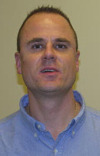Graduate Studies features student abstracts
With this issue of The Catalyst, we are inaugurating a new series. We will feature an abstract of our Ph.D. student's dissertation research. Publication of the abstract indicates successful defense of a student's research as judged by the faculty. This feature provides an opportunity for the university family to learn more about the research that our students are conducting. Finally, Michael Schmidt, Ph.D., professor of microbiology and immunology, deserves credit for coming up with the idea for this column.—Perry Halushka, Ph.D., M.D., dean, College of Graduate Studies
Dissertation title: IL-2 Receptor Signaling
Regulates Ets1 Translation in Human Natural Killer Cells.
Ph.D. candidate: Eric M. Grund MCBP program
Successfully defended on Aug. 25.
Mentor: Robin Muise-Helmericks, Ph.D., assistant professor, Hollings
Cancer Center
 Eric
M. Grund
Eric
M. Grund
My researched focused on studying cellular signaling within the immune system, specifically the Natural Killer (NK) cell.
The NK cell is responsible for regulating the immune system and killing diseased cells. Cells communicate with other cells throughout the body by secreting interleukins (IL). IL-2 and IL-15 and their receptors are essential for NK development and function. An organism lacking NK cells is susceptible to viral infection and cancer.
The NK cell has IL-2 receptors on its surface that are shared by IL-2 and IL-15. My research demonstrated that IL-2 receptor signaling through the intracellular biochemical's MEK>ERK1>MNK1>eIF4E regulates the synthesis of Ets1 protein. Like IL-2 and IL-15, Ets1 is also essential for the development and function of NK cells. Taken together these results suggest a biochemical pathway that is critical to NK cells.
This research has led to two manuscripts under revision at the Journal of Biological Chemistry and the Journal of Immunological Methods. Most significantly, the research has the possibility of being applied in developing treatments for various diseases including cancer and infectious diseases.
Future plans: Currently I am a post doctoral fellow at Serono's U.S. headquarters in Boston, Mass.
While at Serono, I will be utilizing the latest technology to analyze the biochemistry of human embryonic stem cells. The aim of this research is the creation of novel diagnostics and therapeutics for an array of disease states.
In addition to scientific research at Serono, I am studying to finish
an MBA. My long-term goal is to found a biotechnology company drawing on
the exciting discoveries of science.
Friday, Oct. 1, 2004
Catalyst Online is published weekly, updated
as needed and improved from time to time by the MUSC Office of Public Relations
for the faculty, employees and students of the Medical University of South
Carolina. Catalyst Online editor, Kim Draughn, can be reached at 792-4107
or by email, catalyst@musc.edu. Editorial copy can be submitted to Catalyst
Online and to The Catalyst in print by fax, 792-6723, or by email to petersnd@musc.edu
or catalyst@musc.edu. To place an ad in The Catalyst hardcopy, call Community
Press at 849-1778.